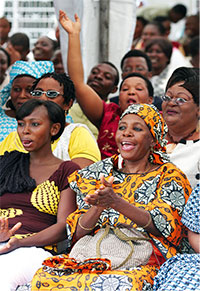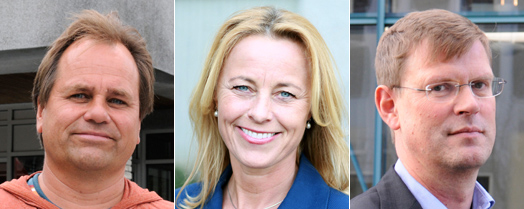The Kavli Trust supports the research project Girl Power
The Kavli Trust has donated NOK 800,000 to support a research project run by The Choice Lab in Tanzania. The Girl Power project is more than just pure research.
12.02.2015 - Torill Sommerfelt Ervik
It has the objective of helping young girls in Tanzania have greater financial independence.
The Girl Power project has the objective of empowering young women in developing countries.
"What is special about this project is the focus on health and entrepreneurship training. Empowering poor, young village girls through education and vocational training makes these girls independent. Supporting education is an investment in a joint future," said Kavli Trust Managing Director Inger Elise Iversen.
Control over their own lives
"In countries like Tanzania, the girls are in a very vulnerable situation during their adolescent years. They marry and have children at an extremely young age. This exposes them to complications relating to birth and sexually transmitted diseases and gives them few opportunities to make independent decisions," said Bertil Tungodden.
Girl Power is a collaboration between The Choice Lab researchers Mr Tungodden, Kjetil Bjorvatn and Lars Ivar Oppedal Berge. Together with them are researchers Vincent Somville (CMI), Linda Sekei Helgesson (DPC) and Tausi Kida (ESRF), all of whom are affiliated with the The Choice Lab through the Department of Economics at the Norwegian School of Economics (NHH).
Projects that offer information regarding health and family planning have proven to have had relatively little effect on the lives of girls in poor countries.
Therefore, the Girl Power project focusses on education and training.
"We have designed two training modules, one with a focus on health and one with a focus on financial independence where they are taught how they can start their own business. The goal is that the training will provide the girls with more choices and greater control over their own lives," Mr Tungodden said.
Unique knowledge

The Choice Lab has had several research programs in Tanzania. This is from Dar es Salaam in 2009. Photo: Sigrid Folkestad
In autumn 2014, 3,600 school girls in rural Tanzania were involved in a field experiment. Some schools were involved in courses, others were placed in control groups.
"We have already had two follow-up studies of the intervention in which we have collected self-reported data, however the money from the Kavli Trust has now given us the opportunity to carry out a medical follow-up to test cases of sexually transmitted diseases and pregnancies. This will provide us with unique knowledge about the effect of this type of training," Mr Tungodden said.
The NHH researcher believes that the follow-up studies that have been carried out have already demonstrated positive effects of the project. The Choice Lab group has found changed attitudes towards gender equality among the girls, who have acquired more knowledge, more long-term plans and greater optimism.
"In the long-term, we would like this type of training to be used more in schools in countries like Tanzania. In the short-term, other voluntary organisations have made use of the knowledge from the project," Mr Tungodden said.
Inger Elise Iversen from the Kavli Trust hopes that the results may also be able to be used in other projects in other countries.
"We are focussed on sharing the expertise. It is precisely research that is often missing in projects such as these. However, in this case we examine whether it actually works, and properly evaluate the work," Ms Iversen concluded.
Pleased about the support
Aksel Mjøs is the Chairman of the Kavli Trust. He is also an associate professor at the NHH Department of Finance and therefore a colleague of The Choice Lab researchers.
Mr Mjøs emphasised that the Kavli Trust's assessments of projects are completely independent, however, as a matter of form, he has not had any involvement in the preparations so as to avoid a conflict of roles.
However, he still did not hide the fact that he was pleased that the Trust wanted to support the Girl Power project in Tanzania.
"The Kavli Trust is an ambitious, charitable provider with a focus on the development effects for those who receive funds from us. Girl Power is therefore a good fit, because it provides direct help and insight into how training results in development, while at the same time the quality of the research in the evaluation is of major direct and indirect importance," Mr Mjøs said.
"Why have you become involved with the Kavli Trust?"
"The Kavli Trust is unique since we manage a large, international food company with a purely charitable objective. It is fundamentally meaningful to be able to manage the business activities, known through Kavli and the Q-Dairies in Norway, as professionally as possible, while at the same time being allowed to support so many important projects with more than NOK 40 million this year. For me personally, this also triggers both my commercial expertise and my social responsibility," Mr Mjøs said.
The Kavli Trust
The Kavli Trust owns the Bergen-based Kavli food group, and this ownership provides the basis for its financial support of good causes. Part of Kavli's profits are reinvested to strengthen and develop group's operations, while the remainder benefits research, cultural activities and humanitarian work through the trust.

Professor Bertil Tungodden, Managing director of the Kavli Trust Inger Elise Iversen, and chairman of the Kavli Trust Aksel Mjøs.
|

